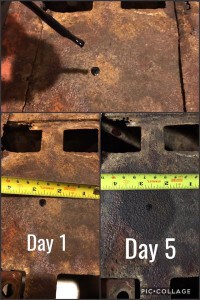Vehicle Undercoating Pros and Cons
[embedyt] https://www.youtube.com/watch?v=KDCVCck2zHw[/embedyt]
If you are considering undercoating your car, it is a good idea to weigh the pros and cons before making your decision. While undercoating is not rocket science, it is important to also keep in mind, that if it is not done right, it is useless.
The war against rust may be ultimately unwinnable, but rustproofing and undercoating can help extend your vehicle’s life!. Rustproofing and undercoating can defend against the onslaught of rust-causing road salt and brine for so long. Victory requires vigilance.
Why is car undercoating so important to all drivers? Your car is a major investment, and it should be protected! Overtime this rust will cause corrosion and can lead to part failure and a whole host of other issues. Rust is not just ugly but can trigger a number of different system breakdowns, such as leaks that can lead to gradual fuel wasting and even sizable components like the engine and transmission failure. System harm can be frustrating. If you don’t defend your vehicle with something, then you may make it a lot more vulnerable to system harm.
Rust will reduce the life and residual value of your vehicle not to mention safety hazards and so it’s vital to take steps to prevent rust from happening!
Many people live in places where inclement weather can have a negative impact on their motor vehicle. Abrasive road salt, road brine, sticky tree sap, fine scratches left by low-hanging tree limbs — all can rub away the manufacturer’s paint and then wipe away the coat on top of it. And once your vehicle’s paint begins chipping away, damaging rust isn’t far behind.
With the introduction of road brine, this toxic substance is able to get into all the nooks and crannies where traditional road salt could-not. Many road brines contain sticky additives so that the toxic substance will not wash off the road easily. The problem is when you drive over these sticky substances they do not discriminate!
Vehicle Undercoating Pros and Cons by Our Customers
In a 2017 report issued by AAA, it estimated that US drivers pay an estimated $3 billion annually in rust repairs caused by de-icing methods
Many ingredients found in today’s road deicing products allow them to work at a much lower temperature, unlike traditional rock salt.
Did you know many carwashes recycle their water? Are they removing these toxic substances or are they just pushing them deeper into the body cavities? Due to regulatory pressure, many carwashes are forced to recycle water and many choices for economical reasons. Many touchless carwashes use between 50 and 150 gallons per vehicle! Carwashes must pay for water coming in as well as going out.
Getting ready to protect your car from rust is a smarter option to protect your investment. In this article, we’ll discuss what undercoating is and how it helps to prevent your car from corrosion & rust.
The Fundamentals of Car Undercoating
The best time to apply an undercoating to a car is when the car is new. This is because there is not yet debris, residue, and corrosion on the underside of the car.
Car undercoating, in a nutshell, is a type of defensive layer that’s applied to the undercarriage of vehicles.
Traditional hard or rubberized undercoating versus soft oil undercoating is your choice.
Let’s qualify this first. If your vehicle has existing rust then you really only have one choice if you want the application to be effective.
Covering rust with hard paint or rubberized wax undercoating will only trap moisture below the surface and allow oxidation to continue.
Removing rust prior to can be more effective but tricky because rust is like cancer, it burrows deep below the metal surface. For this reason, we believe the approach of encapsulating rust is not worth the effort or the cost.
Oil undercoating, unlike traditional rubberized, paint or wax undercoating, penetrates through rust down to the good metal, displacing moisture and eliminating oxygen, take either out of the equation and oxidation cannot occur.
Oil undercoating if engineered for the application should also have the ability to creep and migrate deep into body cavities where rust is prone to begin. A good oil undercoating will creep 4 to 6 inches ensuring that spot welds, seams, folds are penetrated and protected.
These inner body cavities are generally unprotected and prone to hold dirt and moisture.
Soft undercoating is self-healing. If a rock hits the surface, it will not chip and will self heal maintaining the protective barrier.
Wax or rubberized undercoating should only be applied to a new rust-free surface. One where you can see and ensure 100% coverage.
It is important that the vehicle is inspected every couple of years to ensure that the barrier has not been breached. This surface should be able to take abrasion and not chip. We believe it is critical that the body cavities are treated with oil undercoating In conjunction with the hard/wax undercoating for complete comprehensive protection.
It could help to reduce interior noise.
When you’re driving, the sounds of the road can be loud. For lightweight vehicles, noise pollution can be overwhelming to the driver in some situations. Applying a layer of undercoating creates a barrier against the sound, which creates an interior that is noticeably quieter. After the service is performed, many drivers notice that audio levels are noticeably lower inside their vehicles.
It can be self-applied.
Rustproofing works best when you have this service professionally applied to your vehicle. If money is tight, however, and you have some basic car maintenance skills, then you can do the work yourself.
NHOU has public workshops and how-to videos
If this service is applied at the dealership, it may cost up to $1,000, depending on the make and model of your vehicle. Some dealers include it in a package of services that are priced even higher. When you do the job yourself, then the cost can be less than $100 for cars and under $150 for trucks and SUVs.
Just keep in mind that you’re going to be creating a bit of a mess while applying a DIY undercoat.
It will Extend the Life & Value of your Vehicle.
Good undercoating extends the life of your vehicle. Corrosion does more than affect the integrity of the metals in your vehicle. It can get into your metal wires and cables, affecting any component which is comprised of steel or aluminum. Even your transmission and engine have exposure to rust when there isn’t a vehicle undercoating applied.
Undercoating Cons
Oil-based Rustproofing must be reapplied every year for the best results.
The only way for an undercoating to provide ongoing protection for your vehicle is to have the service repeated frequently. Most owners can have a new layer applied each year without worrying about their underbelly being compromised. In salty or destructive environments this is a must! Don’t wait until you have a structural failure or fail a safety inspection. Deal with rust as you would any other maintenance item on the vehicle.
How Long Does Undercoating Last?
The length of time undercoating remains effective is dependent on the environment it is exposed to and the use of the RV. Undercoating on a parked trailer for example may last years. A motorhome or trailer seeing a lot of road travel may require reapplication sooner due to impacts against the frame potentially chipping away at the coating.
Undercoating should still be visually inspected annually to ensure integrity.
Why Undercoat Your RV
RVs benefit from undercoating more than rust proofing in part due to their construction. Where automobiles have sealed areas and tubular frames, recreational vehicles are built on top of an open rolling-chassis or trailer frame. This frame is almost entirely accessible and able to have undercoating applied to all exposed areas. Since undercoating also provides protection against heat, stress, noise, and condensation while not requiring reapplication annually, it becomes an easy choice for a recreational vehicle.

 Buy US Direct
Buy US Direct Buy CA Direct
Buy CA Direct Buy EU Direct
Buy EU Direct Buy DE Direct
Buy DE Direct
